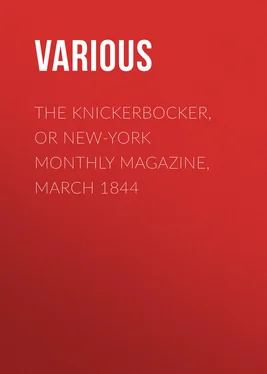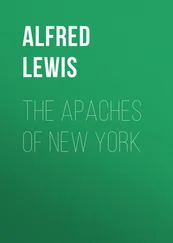Various - The Knickerbocker, or New-York Monthly Magazine, March 1844
Здесь есть возможность читать онлайн «Various - The Knickerbocker, or New-York Monthly Magazine, March 1844» — ознакомительный отрывок электронной книги совершенно бесплатно, а после прочтения отрывка купить полную версию. В некоторых случаях можно слушать аудио, скачать через торрент в формате fb2 и присутствует краткое содержание. Жанр: foreign_antique, periodic, foreign_edu, на английском языке. Описание произведения, (предисловие) а так же отзывы посетителей доступны на портале библиотеки ЛибКат.
- Название:The Knickerbocker, or New-York Monthly Magazine, March 1844
- Автор:
- Жанр:
- Год:неизвестен
- ISBN:нет данных
- Рейтинг книги:5 / 5. Голосов: 1
-
Избранное:Добавить в избранное
- Отзывы:
-
Ваша оценка:
- 100
- 1
- 2
- 3
- 4
- 5
The Knickerbocker, or New-York Monthly Magazine, March 1844: краткое содержание, описание и аннотация
Предлагаем к чтению аннотацию, описание, краткое содержание или предисловие (зависит от того, что написал сам автор книги «The Knickerbocker, or New-York Monthly Magazine, March 1844»). Если вы не нашли необходимую информацию о книге — напишите в комментариях, мы постараемся отыскать её.
The Knickerbocker, or New-York Monthly Magazine, March 1844 — читать онлайн ознакомительный отрывок
Ниже представлен текст книги, разбитый по страницам. Система сохранения места последней прочитанной страницы, позволяет с удобством читать онлайн бесплатно книгу «The Knickerbocker, or New-York Monthly Magazine, March 1844», без необходимости каждый раз заново искать на чём Вы остановились. Поставьте закладку, и сможете в любой момент перейти на страницу, на которой закончили чтение.
Интервал:
Закладка:
They were about twenty in number, and not greatly distinguished from the ordinary poor of a country town in New-England; unless by there being present three idiot daughters of one poor man, whose low and narrow foreheads, sunken temples, fixed but dead and unmeaning eyes, half opened and formless mouths, indicating even to childhood the absence of that intellectual light, which in those who possess it shines through the features. Insanity also was there, that most dreadful infliction of Providence; the purpose of which lies hidden in the darkness which surrounds His throne. Its unhappy subject was with them, but not of them. His eyes were fixed upon the scene, but the uncertain fire which illumined his features was caused by thoughts which had no connection with the passing scene.
Vice, too, had its representatives; for in a community where wealth is nearly the only source of distinction, and where Mammon is consequently worshipped as the true god, the destiny of the unfortunate and of the vicious is nearly the same. And the ‘poor-house’ was used, as in other towns in New-England, as a house of correction, and at this time contained several professors of vice of each sex. Alas! of that sex which when corrupt is more dangerous than the other in a like condition, as the most rich and grateful things are in their decay the most noxious!
The remaining number consisted of the aged and childless widow, the infirm and friendless old man, the sick, the deformed, and the cripple; the virtuous poor, in forced and loathed contact with vice and infamy. Those of society who in life’s voyage had been stranded on the bleak and barren coast of charity, and who were now waiting for death to float them into the ocean of eternity. While this scene was passing at the alms-house, another connected with it, and fitted to excite still deeper feelings, was acting in another part of the town.
A person who was that year one of the select-men, 1 1 Men who are yearly selected by the inhabitants to superintend the business of the town, and who, among other duties, have the charge of managing the poor.
and a deacon in the church, was delegated by his colleagues to bring to the alms-house the ‘lone woman’ who forms the chief subject of our homely story. The widow Selden (a brief history of whom it will be necessary to give) had received an education suited rather to the respectability and former wealth of her family, than to its subsequent reduced condition, became in early life the wife of a merchant of our village, a man of good character and fair prospects, to whom she was much attached. Traders in New-England where wealth is so eagerly sought, are, especially in country towns, men of much consideration, as engaged in a money-making business. Mrs. Selden, therefore, independently of her personal merits, was not likely to be neglected. Her company was sought by the best society of our place, and she exchanged visits on equal terms even with the families of the clergyman and the village lawyer.
A few years of quiet enjoyment passed, happily varied by the accession of a fair and delicate little girl, who might be seen at their cheerful meals seated in her high chair, the common object of their care and attention; and not only affording in her fragile little person the strongest bond of union, but the never-tiring subject of conversation. Sad indeed was the change in this once happy family, when the widow and orphan sat alone at the cheerless board. Death had entered and taken from them the sun of their little world. The bereaved wife might have sunk under this calamity, had not maternal solicitude been mixed with grief. With that admirable fortitude and submission to duty so common to those of her sex in similar circumstances, she at once devoted herself with increased solicitude to the remaining object of her care and affection.
For a time but little change was visible in the family arrangements, for though a sensitive she was a spirited woman. Her garden, which had been the pride and delight of her husband, still flourished in perfect neatness. After the usual time of decent seclusion, she again interchanged visits with her friends and neighbors, and continued to maintain the stand in the village society which had always been conceded to her. But this state of things did not long continue, for alas! the gathering as well as the protecting hand was removed. Her more aristocratic acquaintances now began to remark that her table showed less of plenty and variety than formerly, and that her dress, though perfectly neat, was less new and fashionable than they expected in their associates; for no where is the distinction between the rich and poor more rigidly enforced than in country villages. Most offensively marked is this distinction in the house of God, where if any where this side the grave ought the rich and the poor to meet on a level, before Him who regards not the outward estate of his creatures. But modern Christians have contrived to evade the rebuke of the apostle by the cunning device of introducing the noisy auctioneer, and under a show of fairness and equality, ‘the man in goodly apparel and having a gold ring’ is assigned the highest seat; and albeit a skeptic, by the weight of his purse crowds the humble worshippers to the wall and into the corners of their Father’s house.
It was observed that the lone woman declined competition for those seats so eagerly sought by the more wealthy, and selected those of a humbler character, and eventually retired to the ‘widow’s pew,’ a pew set apart, in country churches, for the gratuitous accommodation of those in that unhappy condition. Sincerely religious, the Christian widow still waited upon God in the house of prayer, but felt the whole sting of poverty when slowly and humbly wending her way to her obscure corner, her faded and well-worn dress was brushed by the new and rich garments of her former equals as they swept past her to their high seats. The neat and handsome dwelling with its trim garden was at length resigned for one which barely sheltered the mother and child from the weather, and was totally devoid of the cheap luxury of fruit and flowers which had enriched and beautified their former home.
Time wore on, and Want with its train of sordid attendants visited their dwelling. Her former associates, one after another declined her society as an equal. Occasionally calling, they were eloquent in excuses for their neglect; for when did the prosperous lack an excuse for neglecting the unfortunate? Counsel and advice were lavished upon her; for I have observed that advice is the only thing that the rich impart freely to the poor. Religion too was the frequent subject of their conversation; for how can benevolence be shown more strongly than by a concern for the well-being of the soul, which is to exist forever, in comparison with which, the transient wants of the body are as nothing? Accordingly, the poor widow, after her scanty meal, and over her dim and cheerless hearth, was exhorted by her fur-clad and well-fed friends , to disregard the evils of this fleeting life, and receive with resignation the chastenings of Providence; for we all needed correction, being by nature utterly sinful and depraved. And after some vague and indefinite offers of assistance, the good women would take their leave. A way of discharging duty discovered by modern philanthropists; and when accompanied by the Societies’ tract, seldom fails to convince the unfortunate object of charity that to Heaven alone should they look for assistance and sympathy.
This lady, as we have intimated, possessed a large share of that generous spirit so common in her sex, which enabled her to sustain herself amid the evils which oppressed her. And nobly did the mother strive to shield from want and ignorance the little orphan, now her only care. Her own education enabled her in some measure to supply the place of teachers, which she was unable to employ. And never was maternal care better rewarded than by the improvement of the gentle being under her charge. But in this blessed employment the poor mother was interrupted. While health continued, she had been enabled by the most unremitted exertion to prevent the approach of absolute want, slight indeed as were her earnings. (The modern improvements in machinery having destroyed domestic manufacture, properly so called, and left but little for the female to earn who is not attending its motions in the noisy factory.) But illness had intervened, and diminished even that small resource; and it was apparent to all that the want of suitable food assisted in blanching still more the fair face of the poor child. Maternal love had conquered the honest pride of the poor mother so far as to constrain her to accept the slight and uncertain donations of her neighbors. But this assistance, scanty as it was, could not continue. The tax-paying husbands of the benevolent ladies who furnished it, complained that the poor-rates were heavy, and that they had already helped to pay for a house of refuge for the poor and the destitute, could not, in addition to this, support them out of it.
Читать дальшеИнтервал:
Закладка:
Похожие книги на «The Knickerbocker, or New-York Monthly Magazine, March 1844»
Представляем Вашему вниманию похожие книги на «The Knickerbocker, or New-York Monthly Magazine, March 1844» списком для выбора. Мы отобрали схожую по названию и смыслу литературу в надежде предоставить читателям больше вариантов отыскать новые, интересные, ещё непрочитанные произведения.
Обсуждение, отзывы о книге «The Knickerbocker, or New-York Monthly Magazine, March 1844» и просто собственные мнения читателей. Оставьте ваши комментарии, напишите, что Вы думаете о произведении, его смысле или главных героях. Укажите что конкретно понравилось, а что нет, и почему Вы так считаете.












